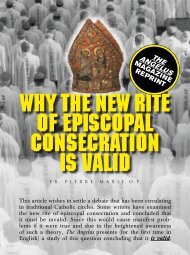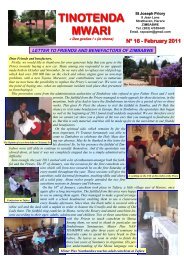Is Feeneyism Catholic? - Society of St. Pius X
Is Feeneyism Catholic? - Society of St. Pius X
Is Feeneyism Catholic? - Society of St. Pius X
Create successful ePaper yourself
Turn your PDF publications into a flip-book with our unique Google optimized e-Paper software.
44 IS F EENEYISM C ATHOLIC?<br />
Thus, had he died, in spite <strong>of</strong> an invalid baptism, he would<br />
still have been saved because <strong>of</strong> the faith <strong>of</strong> the sacrament. Such is<br />
the teaching <strong>of</strong> Pope Innocent III, who did not consider such a<br />
soul outside the Church.<br />
BONIFACE VIII: UNAM SANCTAM<br />
The second text <strong>of</strong>ten referred to by the followers <strong>of</strong> Fr.<br />
Feeney is the bull Unam Sanctam <strong>of</strong> Pope Boniface VIII. Here is<br />
the text:<br />
We are compelled in virtue <strong>of</strong> our faith to believe and maintain<br />
that there is only one <strong>Catholic</strong> Church, and that one apostolic.<br />
This we firmly believe and pr<strong>of</strong>ess without qualification.<br />
Outside this Church there is no salvation and no remission <strong>of</strong><br />
sins. [...] Further we declare, say, define, and pronounce that it<br />
is absolutely necessary for the salvation <strong>of</strong> every human creature<br />
to be subject to the Roman Pontiff (Dz. 468, 469).<br />
Since baptism <strong>of</strong> desire as defined by <strong>St</strong>. Thomas (in conformity<br />
with the whole Tradition) includes the remission <strong>of</strong> sin, and<br />
baptism <strong>of</strong> blood forgives all sin and all penalty due to sin, it follows<br />
logically according to the above principle taught by Pope<br />
Boniface that such persons do belong to the <strong>Catholic</strong> Church,<br />
though their bond is not complete.<br />
Indeed the essential bond with Our Lord Jesus Christ and<br />
His Church is sanctifying grace, a share in the life <strong>of</strong> Christ,<br />
which can only be had within the Body <strong>of</strong> Christ; the character <strong>of</strong><br />
baptism is not the essential bond, it can be had outside the<br />
Church, and all the souls <strong>of</strong> the saints <strong>of</strong> the Old Testament are in<br />
heaven without that character. It is a sign <strong>of</strong> the belonging to<br />
Christ, not the belonging itself; it is a source <strong>of</strong> grace for the faithful<br />
in the Church, but denounces the unfaithful outside the Church.<br />
As for the submission to the Roman Pontiff, it is explicit in<br />
the catechumens who die for the Faith <strong>of</strong> Peter. It is also in those<br />
catechumens who receive faithfully the instructions in the Faith<br />
<strong>of</strong> Peter and out <strong>of</strong> obedience to the authorities <strong>of</strong> the Church<br />
wait for the appointed day <strong>of</strong> their baptism: if an accident happens<br />
to them, their submission to the Roman Pontiff is undeniable.<br />
It is the common teaching that this subjection exists also,<br />
though it may be only implicit, in those who have charity, but<br />
whose knowledge <strong>of</strong> the Faith is limited without fault on their











